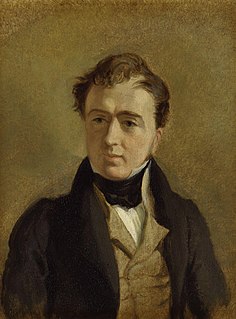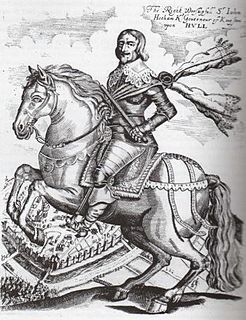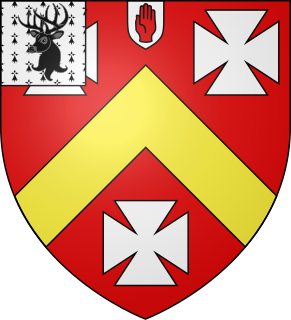See also
| This disambiguation page lists articles about people with the same name. If an internal link led you here, you may wish to change the link to point directly to the intended article. |
Francis Boynton (1677 – 1739) was an English landowner and MP.
Francis Boynton may also refer to:
The Boynton Baronetcy, of Barmston in the County of York, was a title in the Baronetage of England. It was created on 15 May 1618 for Matthew Boynton, son of Sir Francis Boynton of Barmston Hall, in the East Riding of Yorkshire. The Boyntons came to Barmston following the marriage of heiress Margaret de la See to Sir Henry Barmston in the 15th century. The first Baronet married Francis Griffith, heiress of an estate at Burton Agnes including Burton Agnes Hall and Burton Agnes Manor House which the second Baronet inherited in 1647. The fifth and sixth Baronets both served as High Sheriff of Yorkshire, in 1750 and 1771 respectively. The eleventh Baronet died without male issue and the Baronetcy passed to his cousin. His estates however passed to his daughter Cicely whose husband Thomas Lamplugh Wickham changed his name on marriage to Wickham-Boynton, and later (1989) to Cunliffe-Lister relations descended from Mary Constance Boynton, wife of the 1st Earl of Swinton. The title became extinct on the death of the thirteenth Baronet in 1966.
| This disambiguation page lists articles about people with the same name. If an internal link led you here, you may wish to change the link to point directly to the intended article. |

Baron Northbrook, of Stratton in the County of Southampton, is a title in the Peerage of the United Kingdom. It was created in 1866 for the Liberal politician and former Chancellor of the Exchequer, Sir Francis Baring, 3rd Baronet. The holders of the barony represent the genealogically senior branch of the prominent Baring family. The name Northbrook is derived from a tithing of the local parish.

Baron Churston, of Churston Ferrers and Lupton in the County of Devon, is a title in the Peerage of the United Kingdom. It was created in 1858 for the former Conservative Member of Parliament, Sir John Yarde, 3rd Baronet. He had earlier represented South Devon in the House of Commons. Two years later, in 1860, he assumed by Royal licence the additional surname of Buller. As of 2014 the titles are held by his great-great-great-grandson, the fifth Baron, who succeeded his father in 1991.
This is a list of people who have served as Custos Rotulorum of Westmorland.

Burton Agnes Hall is an Elizabethan manor house in the village of Burton Agnes, near Driffield in the East Riding of Yorkshire, England. It was built by Sir Henry Griffith in 1601–10 to designs attributed to Robert Smythson. The older Norman Burton Agnes Manor House, originally built in 1173, still stands on an adjacent site; both buildings are now Grade I listed buildings.

The Sheriff is the oldest secular office under the Crown. Formerly the Sheriff was the principal law enforcement officer in the county but over the centuries most of the responsibilities associated with the post have been transferred elsewhere or are now defunct, so that its functions are now largely ceremonial.

The Strickland, later Cholmley, later Strickland-Constable Baronetcy, of Boynton in the County of York, is a title in the Baronetage of England. It was created on 30 July 1641 for the politician William Strickland.

Sir George Strickland, 7th Baronet, also known as Sir George Cholmley was an English Member of Parliament and lawyer. He took the name Cholmley to succeed to the Cholmley estates in 1865.

Sir William Strickland, 4th Baronet was an English Member of Parliament (MP) and Government Minister in Sir Robert Walpole's administration.

Sir Thomas Strickland, 2nd Baronet was an English politician who sat in the House of Commons in 1659.
Sir Matthew Boynton, 1st Baronet was an English landowner and politician who sat in the House of Commons in two parliaments between 1621 and 1647. He supported the Parliamentary cause in the English Civil War.
Lieutenant-Colonel William Boynton was an English Member of Parliament.
Sir Francis Boynton, 4th Baronet, of Barmston in the East Riding of Yorkshire, was an English landowner and Member of Parliament.
Sir Henry Bellingham, 1st Baronet was an English lawyer and politician who sat in the House of Commons from 1625 to 1626. He supported the Royalist cause in the English Civil War.
Sir James Bellingham, 2nd Baronet was an English politician, lawyer and baronet.

Sir Charles William Strickland, 8th Baronet was an English barrister and a rower who was in the winning crew in the first Grand Challenge Cup at Henley Royal Regatta. He was President of the Yorkshire Philosophical Society.

The Pocock Baronetcy, of Hart in the County Palatine of Durham and of Twickenham in the County of Middlesex, was a title in the Baronetage of the United Kingdom. It was created on 18 August 1821 for George Pocock, Member of Parliament for Bridgwater. He was the son of Vice-Admiral Sir George Pocock. The title became extinct on the death of the fourth Baronet in 1921.

There have been two baronetcies created for persons with the surname Griffith, one in the Baronetage of England and one in the Baronetage of the United Kingdom. Both creations are extinct.
Henry Boynton (1835–1905), was a Union Army officer.

Boynton Hall is a country house in the village of Boynton near Bridlington, East Yorkshire, England. It is a Grade I listed building.